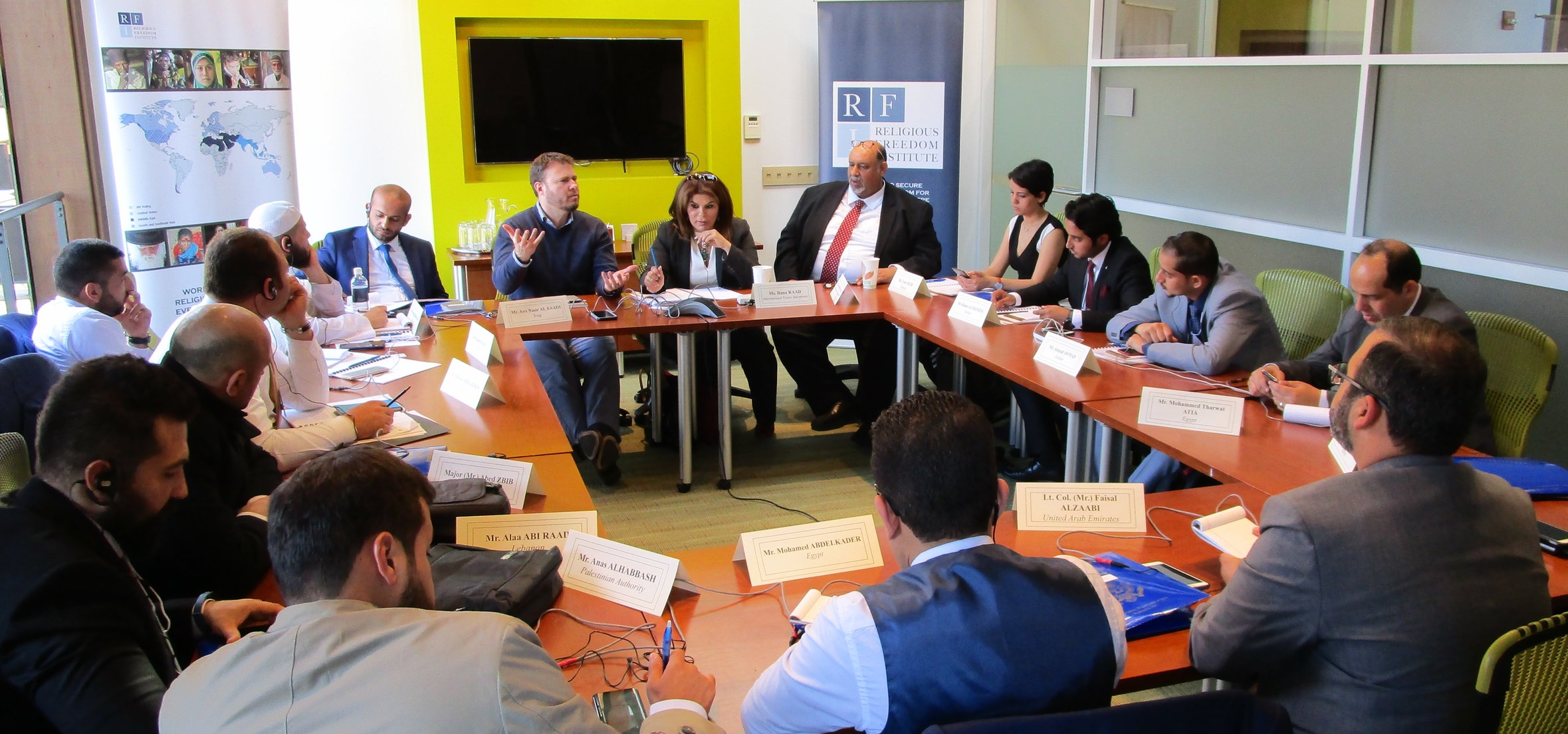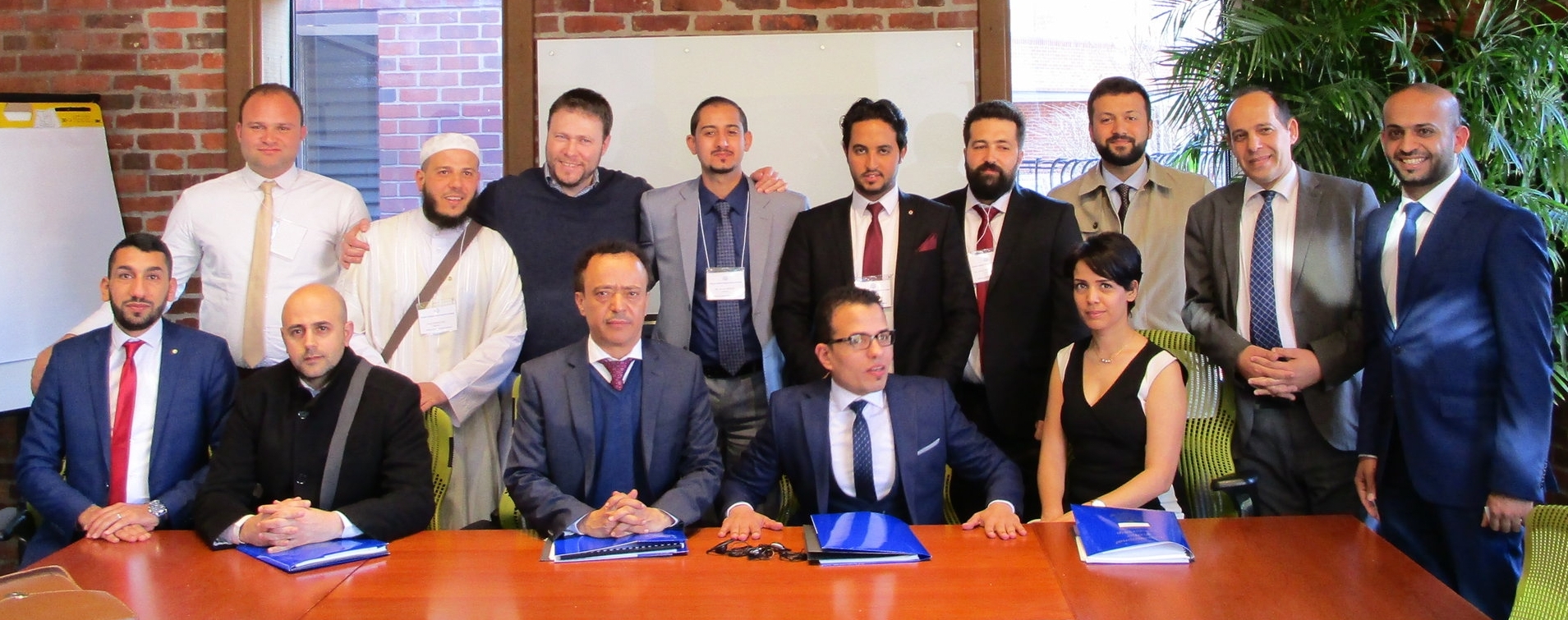One of the most salient obstacles to promoting religious freedom in Muslim-majority regions is confusion about what the term “religious freedom” means. Indeed, the Religious Freedom Institute’s research and experience show that many Islamic scholars in the Arabic-speaking world understand the term “religious freedom” to mean universalism, the synthesis of all religions, or even atheism. If these views were accurate, religious freedom would undermine Islam—as well as any other religion that asserts claims about ultimate truth.
From the perspective of RFI’s Islam and Religious Freedom Action Team, the remedy for this misunderstanding is to go deeper—that is, to focus on promoting and securing acceptance of the foundational human values that make religious freedom possible.
Ismail Royer, Research and Program Associate, led the discussion with participants from across the Middle East and North Africa.
RFI recently put this approach into practice when it hosted a delegation of visiting imams, academics, and NGO leaders from the Middle East and North Africa. As part of the State Department’s International Visitor Leadership Program, the group was touring the United States to examine strategies to counter extremist narratives.
Among other things, we discussed with the group ways in which the principles underlying religious freedom can be an antidote to the phenomenon of extremism and radicalization. My Religious Freedom Institute colleagues and I explained that, rightly understood, religious freedom means that the government neither imposes religious beliefs and practices on individuals nor does it interfere with them.
But, we explained, such a legal arrangement cannot lead to peaceful pluralism without the spread of virtues such as respect for the innate dignity of all human beings regardless of their beliefs, the sincere desire for others’ well-being, and the capacity to overlook or forgive perceived insults. We discussed how America’s founders saw such virtues as critical to the success of their enterprise, and that they also saw religion as necessary for inculcating such virtues. Properly understood, religion can be the bedrock of peaceful pluralism rather than its enemy.
The State Department’s International Visitors Leadership Program is an exchange program that provides professionals firsthand knowledge about U.S. society, culture, and politics, while cultivating lasting relationships. The members of the program joining us at the Religious Freedom Institute included professionals from Algeria, Yemen, Egypt, Iraq, UAE, and Tunisia.
The visitors engaged us in a thoughtful and lively discussion. When they asked for our perspectives on religious freedom for religious minorities in the Middle East and North Africa, we responded that governments in the region need to do more to protect these minorities’ religious beliefs and practices from outside interference. Some participants pushed back, defending the policies of their governments on the grounds that the rights of religious minorities were officially protected.
We shared with them our view that, regardless of official policies, our role as civil society leaders must be to encourage the spread of the fundamental virtues that foster just and harmonious relations between members of different religions.
Religious freedom has valuable contribution to make to the theme the IVLP participants were exploring of “Countering Extremist Messaging and Protecting Youth.”
Several visitors asked for my view of the fundamental flaws in the ideology of Islamist extremism. I told them I consider the extremists’ most dangerous idea to be that they and their followers are in permanent conflict with everyone outside of their sect, including Muslims with whom they disagree and those they deem irreligious. This notion leads quite naturally to denying others’ dignity and humanity and to seeing them as expendable obstacles to the creation of a supposed utopia of pure religious beliefs and practices.
When asked how to counteract this narrative, we pointed again to the virtues that underpin peaceful pluralism. We explained how these can help cultivate a more tolerant and benevolent character in those with intolerant and extreme personalities and clarify their distorted understandings of the religion.
Our engagement with these professionals demonstrated the intense interest many Muslim leaders in the Middle East and North Africa have in the principles of freedom. They want to understand how freedom for all may be respected in society and protected in law without undermining Islamic beliefs and practice. We hope we persuaded some of our visitors that that this is indeed possible.
To raise wider awareness of these truths, RFI’s Islam and Religious Freedom Action Team is working to incorporate this values-based, grassroots approach in Muslim-majority regions with publications in local languages and workshops for imams and other civil society leaders.
THE RFI BLOG

Is Egypt’s Government Trying To Take Over Christianity’s Most Important Monastery?

Does Southeast Asia Lead the World in Human Flourishing?

RFI Leads Training Session on Religious Freedom Law and Policy for U.S. Army War College

Oral Argument in Charter School Case Highlights Unconstitutional Motives Behind OK Attorney General’s Establishment Clause Claim

Largest Longitudinal Study of Human Flourishing Ever Shows Religion’s Importance
CORNERSTONE FORUM

Reaffirming Religious Freedom: Bridging U.S. Advocacy and Iraq’s Constitutional Framework

Political Polarization, Same-Sex Marriage and Religious Liberty

Bridging the Gap Between International Efforts and Local Realities: Advancing Religious Freedom in the MENA Region

Challenges to Religious Freedom in Iraq and the Critical Need for Action



